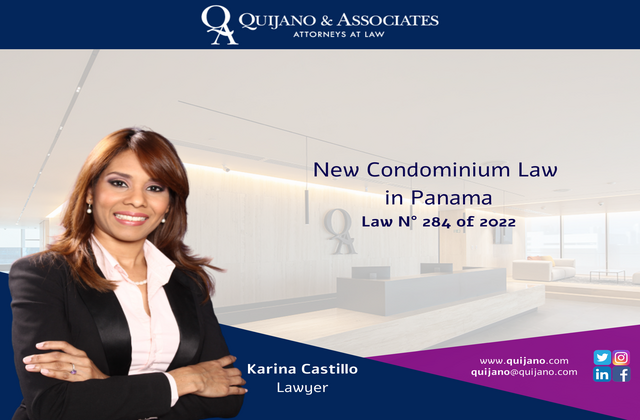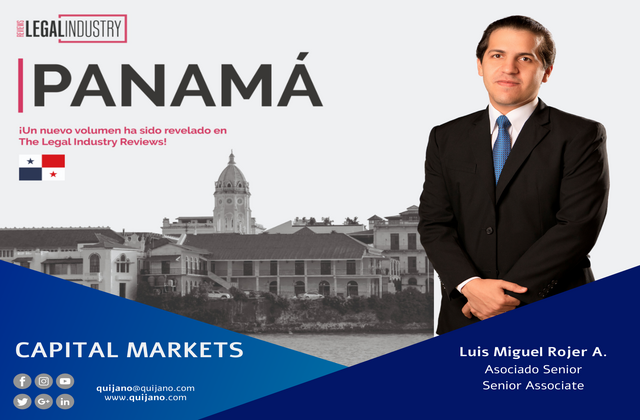New Condominium Law in Panama

With the entry into force of Law No. 284 of February 14, 2022, which regulates the horizontal ownership regime and subrogates Law No. 31 of June 18, 2010, a new regime for Condominium Law in Panama is created.
This Law consists of 10 chapters and 125 articles that bring with them the incorporation of new concepts and principles, new topics are regulated, as well as clear criteria on relevant aspects that we highlight below:
- Seven (7) guiding principles are introduced in order to ensure the maintenance, health, safety and conservation of the private and common properties, as well as the well-being of the owners.
- A glossary of fifty-six (56) terms is also included to facilitate the interpretation and application of the regulations.
- In reference to Real Estate Values, the procedure to fix the value of each unit is determined (i) By decision of the developer; (ii) By agreement of 66% of the real estate units’ owners at their Owners’ Assembly; (iii) By judicial decision; and (iv) By cadastral appraisal.
- Restriction on the sale of annexes to persons who are not members of the same horizontal property ownership.
- It establishes the possibility, after complying with the requirements of this Law, that real estate units may be modified to form other units, to reduce or increase their area.
- The difference between essential and non-essential common goods is established.
- Prior to the entry into force of the Law, the approval of 66% of the Owners at their assembly was required for some common properties to be assigned exclusively to one or more owners and for the modification of the coefficient of participation on the common properties; currently the percentage required for this approval has been reduced to 51%.
- Also contemplated in the title regulating common property is the reduction to 51% of the percentage required for approval at the Owners’ Meeting; for the acquisition of a private property offered by its owner to be used as common property; and for the establishment of parameters for payment arrangements, incentives for advance payments and other actions to improve the collection of common expense installments.
- Article 28 clearly establishes the actions that may be taken against owners who fail to pay the common expense installments.
- Whoever occupies, under any title, the real estate unit shall be liable for damages caused to the common or private property and to third parties due to willful misconduct, fault or negligence of his dependents and/or guests.
- The procedure to establish the economic amount and the origin of damages caused to common or private property attributable to a unit and its owner is determined. The administrator must have the opinion of a qualified expert, and the report must be prepared with the intervention of the administrator and the affected owners or the designated persons, who may also hire the services of qualified experts in the matter.
- It opens the possibility for the owner of a real estate unit, subject to the authorization of the Board of Directors, to exercise a trade or profession as long as it does not generate additional expenses to the condominium, disturb the security, peace or tranquility of the neighbors or violate the law.
- The regulations list, in a broad manner, the prohibitions for owners and also establish the sanctioning mechanism in case of violation of such prohibitions, with fines ranging from US$50.00 to US$1,000.00.
- For the modification of common expense assessments or the approval of extraordinary assessments, the approval of the Owners’ Assembly is required by the favorable vote of at least 51% of all the units that are up to date in the payment of the common expense assessments. If the quorum is not reached, it is reduced to 30% (the minimum required for approval on the second call).
- Additionally, it is contemplated that in order to approve the construction of additional improvements to be incorporated to the horizontal property, 51% of the totality of the real estate units that are up to date in the payment of the installments will be required.
- Title VI regulates all matters related to the incorporation of the Horizontal Property Regime.
- The Contingency Fund is mandatorily introduced, which will correspond to at least 1% of the total income and the annual common expense fees collected; and its use is restricted to foreseeable expenses that are part of the usual and/or normal maintenance of the condominium property.
- The developer is obliged to pay a share-fee for the annexed properties that have not been assigned to a real estate unit and that are reserved by it, once the sale of all the real estate units is registered, such share to be determined in the Coownership Regulations.
- When the sale of 51% of the real estate units of the condominium is perfected, the owners shall have the right to elect a Board of Directors to replace the members appointed by the developer, and the latter shall deliver the documentation listed in Article 54.
- Owners are granted the possibility of being represented at the Owners’ Meeting by means of a power of attorney, which may be granted electronically, in addition to a physical, public or private document, and that the meetings be held by technological means.
- The number of real estate units is increased to 20 in order to dispense with the appointment of a manager.
- Among the functions of the administrator, the obligation to notify monthly the mortgagees of the units that are 4 months in arrears in the payment of the common expenses is established.
- The penalties that may be applied by the Directorate of Horizontal Property to those who fail to comply with the provisions of this Law and the regulations are modified from US$ 500 to a maximum of US$ 5,000.
- In the title of Dispute Resolution, the power of the owners to submit to arbitration processes for the resolution of their disputes is added, and the Judicial Branch is empowered to create specialized courts to hear exclusively horizontal property matters.
- Actions against decisions of the Assembly of Owners, of the Board of Directors and of the Administrator are subject to the statute of limitations in 3 months, counted from their publication, their delivery to the owners, or their registration in the Registry, when applicable.
- The Members of the Board of Directors or the Administrator who fail to comply with the obligations set forth in this Law, and its subsequent regulations; or if they incur in irregular handling of the owners’ dues or of the funds of the condominium, shall be temporarily or definitively disqualified for the position and their competence shall be of the Directorate of Horizontal Property or of the jurisdictional or arbitration authorities.
We hope you find this information useful, and we remain at your disposal in case you have any additional questions or doubts about this new law at quijano@quijano.com.




